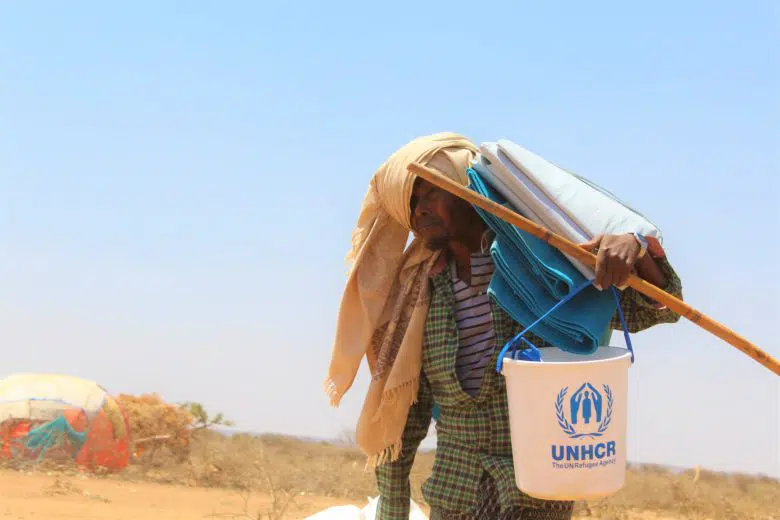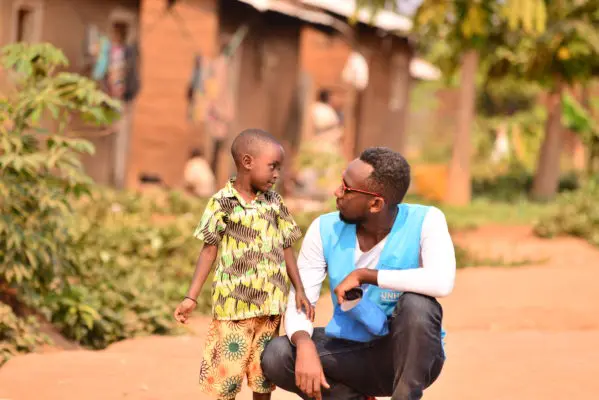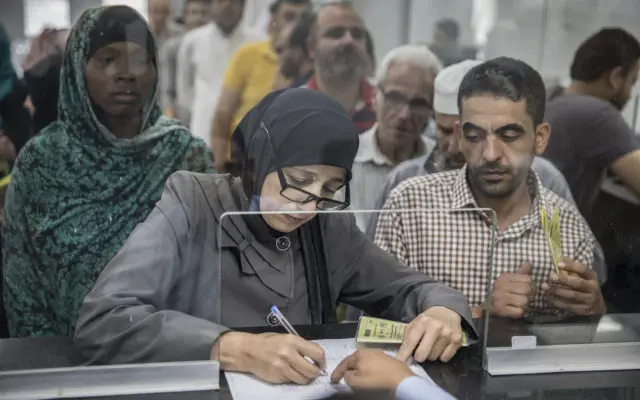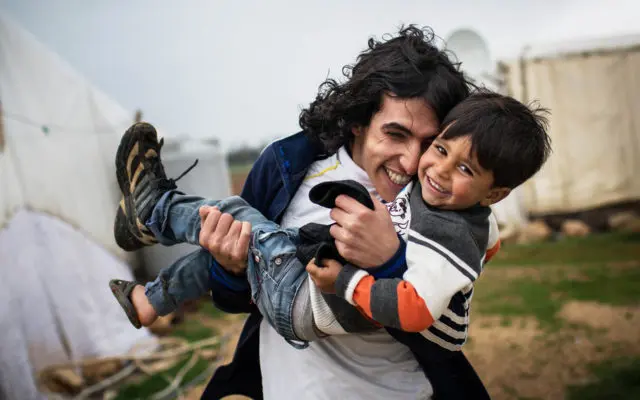
UNHCR distributed core relief items such as sleeping mats, blankets, buckets, jerry cans and solar lamps, to more than 200 internally displaced families, who were sheltered at the Wabi-Ugur site in the semi-desert of El-Ogaden, Somali Region. © UNHCR/Hanna Qassis
Answering frequently asked questions about how donations help refugees and their families.
Refugees and internally displaced people who are fleeing their homes are supported by the United Nations High Commissioner for Refugees (UNHCR). UNHCR, also known as the UN Refugee Agency, provides humanitarian assistance to those most in need. Learn about how donations enable displaced families to receive a range of support.
UNHCR operates in more than 130 countries. We continue to provide humanitarian assistance to refugees and internally displaced persons fleeing their homes due to war, violence, conflict, persecution, or natural disasters. When a person is forcibly displaced, we provide them with emergency assistance including healthcare, shelter, food and water. Long-term, we help forcibly displaced people access education, train for work opportunities and get opportunities to return home safely or rebuild a new life. Through the generosity of your donations, UNHCR can provides assistance to refugees and other displaced persons in need worldwide.
Why are donations to UNHCR so important?
Donations impact the ongoing delivery of essential supplies, like shelter, medicine, cash assistance, books for refugee students and more. UNHCR uses donations to provide relief in response to ongoing and new emergencies around the world. In 2020 alone, aid was provided to 26 million people helping refugees, and displaced families survive and thrive.
Blankets and sleeping mats have been provided so that families can sleep safely and keep warm. Cooking utensils are given to help families collect and prepare food. Solar lamps are provided so that families can stay safe after dark. Additionally, jerry cans help people to collect and store clean water.
When refugees and displaced people are forced to flee their homes, they often leave with very few belongings. This makes essential supplies like plastic tarps and mosquito nets even more crucial.
What is cash assistance?
Another way that UNHCR provides aid is through cash assistance, which is especially important for the many refugees who live in cities. Direct cash grants are given to those families most in need, allowing them to purchase the things they most need from their host communities. This brings dignity to refugee and displaced families and restores a sense of normalcy. It also helps refugees integrate better into the local communities as they become active participants in the economy. Our studies show that refugees spend the cash they receive on essentials such as rent, food and healthcare. This has been particularly important during Covid where extreme poverty rates are on the rise, especially amongst displaced populations.
UNHCR’s cash assistance programs impact has helped Yemenis families like Wafa. After receiving cash assistance, it allowed her to feed her family. “I have flour, beans, and gas. I feed my family with what I have.” As millions have been driven from their homes due to the ongoing conflict crisis in Yemen, cash assistance provides families with the ability to access food and medicine.
How do donations to UNHCR help women and children?
Beyond just cash assistance, UNHCR provides support and safety to many vulnerable groups through emergency response and protection. UNHCR provides aid to unaccompanied children, and women and girls, some of whom have been survivors of gender-based violence. Providing mental health support has been a critical part of helping people who have experienced trauma. As well, UNHCR provides support for women through safe shelters and separate sanitation facilities.
Donations to UNHCR also help fund programs that enhance access for women to employment and removes barriers to education for children. UNHCR brings together governments, international and local organizations to ensure education for refugee children around the world.
Why should I donate to UNHCR?
Because of donations from people and organizations who care about refugees, UNHCR is able to have dedicated teams on the ground to provide help, hope and home to people who have been forced to flee.
The ongoing crisis in Syria has displaced over 12 million people both within Syria and in neighbouring countries. UNHCR remains on the ground leading coordination efforts across the region and providing live-saving humanitarian assistance.
In Ethiopia the impact of the generosity of donors is felt. UNHCR has been able to provide shelter, food, potable water and health screening for refugees from the Tigray Region through its ongoing cooperation with relevant authorities and partners.
With the money raised from the generous donations of our supporters, UNHCR working with partners has been able to support hundreds of thousands of Rohingya refugees who were forced to flee Myanmar.
UNHCR has helped to provide safe shelter, allowing refugees and their families a place to be safe and together. We’ve also been able to build dozens of health and nutrition centers to the region. Additionally, your donations have helped build infrastructure such as roads and bridges. This provides extra security against the elements as the refugees in Bangladesh face harsh weather each year during monsoon season.
Did you know that donations to UNHCR can be claimed on taxes in exchange for tax credits (both federal and provincial)? Despite the fact that the terms are often used interchangeably, tax credits are different from donations that are tax deductions (or ‘deductibles’). Tax deductions lower the amount on which you will be charged taxes; tax credits reduce the amount of taxes owed. Giving to charity can reduce, or even cancel, the tax you would otherwise have to pay to the government.
How much of my UNHCR donation goes to refugees?
Donations to UNHCR Canada directly support the UN Refugee Agency’s work on the ground in the world’s most vulnerable countries. To best help internally displaced persons and refugees around the world, UNHCR ensures that resources are used ethically and efficiently. That’s why 81% of every donation goes directly to refugees and displaced families living in dire conditions. Your donation gives refugee children and their families hope for a brighter future.
In addition, 15% goes to support implementing the UN Refugee Agency programs around the world. This means that only 4% goes towards management and administrative costs. UNHCR’s committed staff raises funds all year round from individuals, governments and other entities to support our programs and respond to new emergencies as they arise. Learn more about how UNHCR Canada fundraises.
As humanitarian needs change rapidly, UNHCR depends on donors to provide flexible contributions that can be allocated to meet changing needs. We can then direct funds to places where they are most needed. This enables us to provide humanitarian aid for refugees, asylum seekers, stateless and internally displaced persons (IDPs) without delay.
Tirelessly, UNHCR, who has twice been awarded the Nobel Peace Prize and is an important part of the broader United Nations continues to provide life-saving support to refugees and displaced people in need. The power of donations is far reaching and helps to impact and improve the lives of displaced families. However, with so many global challenges ahead and the number of displaced persons worldwide higher than ever, the time to give is now.
UNHCR depends on donations from our generous supporters. Your donations help fund our cash assistance programs, protect communities in need, support access to education and help those fleeing conflict. Consider giving today.
If you already gave, thank you so much for your generosity. Learn more about UNHCR, the UN Refugee Agency, today.





